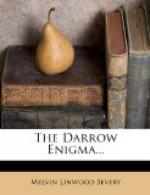If a hazelnut had the shell of a cocoanut, its meat would, in my opinion, sustain about the same relation to its bulk as the gist of the usual legal proceeding sustains to the mass of verbiage in which it is enshrouded. For this reason you will not expect me to give a detailed account of this trial. I couldn’t if I would, and I wouldn’t if I could. My knowledge of legal procedure is far from profound, albeit I once began the study of law. My memories of Blackstone are such as need prejudice no ambitious aspirant for legal honours. I have a recollection that somewhere Blackstone says something about eavesdropping,—I mean in its literal sense—something about the drippings from A’s roof falling on B’s estate; but for the life of me I couldn’t tell what he says. More distinctly do I remember this learned lawgiver stated that there could be no doubt of the evidence of witchcraft, because the Bible was full of it, and that witches should be punished with death. This made an impression upon me, because it was an instance, rare to me then, but common enough now, of how minds, otherwise exceptionally able, may have a spot so encankered with creed, bigotry, and superstition as to render their judgments respecting certain classes of phenomena erroneous and illogical, puerile and ridiculous.
But to return to those points of the trial which I can remember, and which I think of sufficient interest to put before you. These refer chiefly to Maitland’s examination of M. Latour, and of the government’s chief witness, M. Godin. Such portions of their testimony as I shall put before you I shall quote exactly as it was given and reported by Maitland’s friend, Simonds.
When Maitland began for the defence he said:
“At about half-past seven on the night of the 22d of April, John Darrow met his death at his home in Dorchester. He died in the presence of his daughter, Messrs. Willard, Browne, Herne, and myself. His death was caused by injecting a virulent poison into his system through a slight incision in his neck. That wound the prisoner before you confesses he himself inflicted. I would like to know a little more definitely how he succeeded in doing it without detection, in the presence, not only of his victim, but of five other persons sitting close about him. M. Latour will please take the stand.”
As M. Latour stepped into the witness-box, a wave of suppressed excitement ran all over the court-room. Every nerve was strained to its tensest pitch, every ear eager for the slightest syllable he might utter. What could be done for a man who had confessed, and what would be the solution of the crime which had so long defied the authorities? The explanation was now to be made and it is no wonder that the excitement was intense.
I omit all uninteresting formalities.
Q. Have you ever seen me before to-day?
A. Not to my knowledge.
Q. Have you any reason to believe I have ever seen you before to-day?




